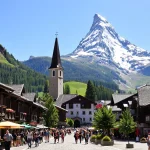Unique Cultural Experiences in Lesser-Known UK Destinations
Exploring lesser-known UK destinations offers a rich opportunity for cultural immersion. These places allow travelers to engage deeply with authentic local culture, experiencing traditions often untouched by mass tourism. Unlike major cities, small towns present unique chances to participate in community events or festivals that reflect regional traditions passed down through generations.
When you ask, “What makes cultural experiences in small towns so special?” the answer lies in their intimate community connections and preserved heritage. Events such as village fairs, local markets, or seasonal celebrations provide a genuine glimpse into daily life and customs not typically found in guidebooks. Visitors often find themselves interacting directly with locals, gaining firsthand stories and historical insights.
Also read : How are cultural festivals influencing UK tourism dynamics?
Moreover, discovering regional history in these hidden areas enhances appreciation for the diverse cultural fabric of the UK. From ancient crafts to folklore and dialects, every element enriches the journey. This form of travel fosters respect for local identity and encourages meaningful exchanges beyond surface-level sightseeing. Embracing these authentic cultural experiences creates lasting memories and a deeper understanding of the places visited.
Cost Savings and Budget-Friendly Travel
Choosing lesser-known destinations makes affordable travel easier, offering significant cost savings without sacrificing experience quality. Smaller towns often have lower accommodation prices, with charming guesthouses and family-run inns providing budget-friendly options. Unlike major cities where hotel rates can skyrocket, these areas deliver comfort at a fraction of the cost.
This might interest you : What Are the Hidden Spots in the UK That Tourists Often Overlook?
Food expenses also decrease as local eateries serve authentic meals at lower prices compared to tourist hotspots. This contributes to saving money UK travel budgets while enjoying genuine tastes linked to authentic local culture. Moreover, entry fees for attractions or community events tend to be modest or sometimes free, unlike the high costs of major museums or tour packages found in urban settings.
By focusing on budget destinations UK, travelers can allocate funds to unique experiences unavailable in crowded cities. Examples include guided nature walks, DIY cultural workshops, or seasonal festivals that offer genuine insights into regional traditions. This approach maximizes value while fostering meaningful connections and exploration.
Ultimately, cost savings paired with quality experiences make less-touristed UK locations an excellent choice for those seeking both economic and cultural rewards during their journeys.
Environmental and Sustainable Travel Benefits
Choosing lesser-known destinations promotes eco-friendly tourism by reducing the strain caused by overtourism in popular UK cities. But what exactly does sustainable travel UK entail? It means minimizing negative environmental impacts while supporting local ecosystems. In lesser-visited areas, the pressure on natural resources and infrastructure is significantly lower, helping preserve landscapes and wildlife for future visitors.
Responsible tourism further encourages travelers to engage in practices that respect the environment and culture. For example, staying in eco-conscious accommodations or using public transport reduces carbon footprints. Local communities often embrace sustainable tourism UK by managing visitor numbers and protecting sensitive habitats, which benefits both residents and travelers.
Another key benefit is supporting conservation efforts. Many rural and coastal destinations rely on responsible tourism to fund environmental projects and maintain biodiversity. This interplay between travelers and local initiatives ensures that eco-friendly tourism creates a positive cycle of protection and enjoyment.
By focusing on sustainable travel UK and responsible tourism, visitors can enjoy authentic experiences while making a tangible difference. This approach aligns values with actions, proving that thoughtful travel in budget destinations UK can also be environmentally conscious.
Supporting Local Communities and Economies
Choosing less-visited areas bolsters local support UK travel by directly benefiting small businesses and family-run accommodations. These establishments form the backbone of rural and coastal economies, often struggling in the shadow of larger urban centres. By staying and spending locally, travelers contribute to the economic impact in meaningful ways that help sustain livelihoods and preserve community character.
How does supporting small businesses influence rural areas? It diversifies incomes beyond seasonal industries, stabilizing village economies and encouraging entrepreneurship. For example, local artisans, farmers, and guides receive greater demand, promoting small business support that keeps traditional crafts and services alive.
Besides financial benefits, respectful tourism fosters community pride. Residents welcoming visitors feel valued when culture and heritage are appreciated without exploitation. This respectful exchange strengthens ties between locals and travelers, enhancing the authenticity of future visits.
In short, local support UK travel encourages a positive cycle: tourists gain richer experiences, while communities flourish economically and socially. This mutual benefit makes less-touristed destinations not just places to visit, but sustainable partners in travel.
Tranquility and Avoiding Tourist Crowds
Seeking peaceful destinations UK offers a valuable escape from the hustle of popular areas. Why is crowd-free travel UK so appealing? Precisely because it enables truly stress-free travel. Lesser-known locations provide quiet getaways where visitors can enjoy undisturbed surroundings, free from the noise and congestion that often dilute tourist experiences.
In these serene environments, uncrowded landmarks and natural sites become easier to appreciate fully. Imagine wandering through a historic village or coastal path without crowds blocking the view or overwhelming the atmosphere. This rare space encourages relaxation and reflection, essential for mental wellness during travel.
Accommodations in peaceful destinations UK also tend to be more tranquil, enhancing restful stays. Travelers often find a harmonious balance between activity and calm, allowing them to recharge while exploring.
Choosing off-the-beaten-path UK spots allows for a deeper connection with the locale. Without the distraction of large crowds, visitors immerse in authentic local culture and appreciate regional traditions in a more intimate setting. Embracing quiet getaways not only enhances the travel experience but also contributes to sustainable tourism by avoiding overtourism in busy hotspots.
Unique Cultural Experiences in Lesser-Known UK Destinations
How can travelers achieve true cultural immersion in small UK towns? The answer lies in engaging with authentic local culture by actively participating in community events that showcase regional traditions. Unlike mass tourism, these events—such as harvest festivals or traditional craft fairs—are often exclusive to smaller communities, allowing visitors to witness and even join in longstanding practices.
What makes these experiences genuinely valuable? They offer direct interaction with residents who act as living custodians of local heritage. Visitors don’t just observe; they absorb stories and customs passed down through generations, gaining insights unavailable in typical guidebooks. This connection deepens understanding and respect for the area’s unique identity.
Moreover, exploring regional history in these areas reveals facets often overshadowed by mainstream narratives. From dialects to folklore and artisanal crafts, each element adds fresh layers to the travel experience. Immersing oneself in such settings transforms a trip into an enriching cultural journey, where every moment reflects the distinct spirit of the locale.






